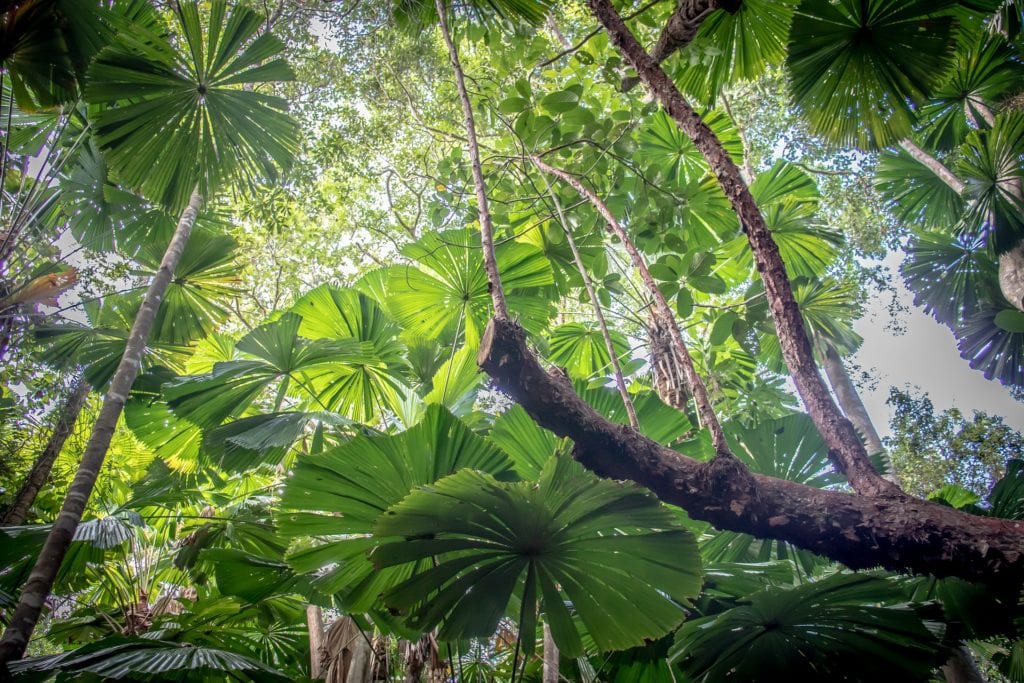Today there is a heightened focus on climate change, which is a serious but not isolated problem. Climate change is a symptom of a deeper malaise. It’s one of many indicators pointing to the crisis now facing us; to the unprecedented damage and destruction we are causing to both ourselves and the world we live within; to the fact that our civilisation is utterly unsustainable.
This crisis is both ecological and social, and its roots are existential. It will not be resolved merely by technological or social fixes, but needs to be addressed at a deeper, more fundamental level.
There is now one dominant global culture, an ever expansionist and predatory industrial capitalism, valuing profit above life. It is a system which reduces the entire natural world – mountains, forests, and oceans; plants and animal species; as well as other human beings – into resources to be ordered and controlled, used and exploited in the pursuit of material growth and economic development – this ever more suffocating technocratic system, is destroying the ecology of life.
A Culture of False Promises and Myths
We needn’t look far for direct experience of the crisis. We are an ecological crisis. Lifestyles of neurotic consumption, bristling alienation, ridiculously convoluted means of securing basic nutrition, the social pathologies which we pass off as culture, all point to an utter devastation of our own nature. The ecological damage we are doing to the planet is equally a destruction of the ecology of our own hearts.
We forget that we are actually wild, that for hundreds of thousands of years hominid animals like us lived stably, often in culturally rich communities, without much complication.
Consequently, our view of what life is has become so perverted that we accept as ‘normal’, an economic system rooted in insatiable destructive greed. We are mostly so enveloped in the urbanised human-centred environment, that we forget that the world is actually wild, forever beyond our control, and that it doesn’t need us. We forget that we are actually wild, that for hundreds of thousands of years hominid animals like us lived stably, often in culturally rich communities, without much complication.

For many centuries now in the west we have understood human history in terms of progress, but looked at in broad evolutionary terms, we may need to face the fact that the departure from hunter-gatherer subsistence might have been a catastrophic detour for our species. In broad evolutionary terms there is little to suggest that the unfoldment of the history of our species is indeed for the better. Indeed, there is a growing realisation of the failure of a culture that becomes unhealthier and more grotesque by the day.
The false promises and myths are falling apart. The myth of history as progress, of technology and human ingenuity to solve all our problems, of salvation through material growth, of our specialness and our centrality to the significance of life on earth – if not the universe, are in tatters. And the lie of ever more and more, and better and better, is crashing upon the rocks of never enough!
Solutions to a crisis of this scale involve far more than technological fixes or market incentives:
- How can there be technological solutions while the ‘drive to mastery’ at the core of technological development remains unchallenged?
- How can there be market based or consumer driven solutions unless we realise that an economic system that regards the natural world as so many resources to be bought, sold, and commodified is deeply irreconcilable with a truly ecological sensibility?
- How can we hope that legislation and regulation will work when our political systems continue to support the disempowerment of the majority of humankind, and drift inexorably towards a lifeboat authoritarianism?
While new technologies, legislation, and changing consumer habits are necessary stop gaps, they are far from sufficient. It is not enough to tinker with the systems we have in place – we must question and change the underlying cognitions and beliefs which determine them.
Deep engagement with our ecological crisis is deep engagement with existential insecurity.
The scale and profundity of the change indicated here can be overwhelming. We can find ourselves reeling at all the issues involved. But, really there is only one issue – LIFE! The way we treat each other, the way we treat other species – animals, the way we treat the environment, are all interlinked.
As the myths and paradigms of our current systems unravel, we find we have arrived at a turning point, where lies a great opportunity. Other strands running through our social and evolutionary history are coming together. A new paradigm is steadily arising. It offers a holistic worldview, a vision of the world as an integrated whole, rather than a dissociated collection of parts. It could be called an ecological view – recognising the fundamental interdependence of all phenomena and the fact that we, as individuals and societies, are embedded in (and ultimately dependent on) the cyclical processes of nature.
This paradigm can help us to make the shift from ways of living based on hierarchy, domination and control to those based on co-operation and partnership; to move from isolating assumptions about our nature to life affirming connection, with others and the living earth.
It can support a transformation quite as far reaching as that which marked the other two major turning points of human history: the Neolithic-Agricultural Revolution and the Industrial Revolution. Some have called the revolution we now require the Sustainability Revolution, others the Great Turning from the industrial growth society to a life-affirming society. It involves a great revolution of the spirit, both individually and collectively. And necessarily includes three aspects:
- Renewal: the renewal and creation of alternatives to the present systems,
- Resistance: a decisive and uncompromising resistance to further destruction, and
- A radical change of consciousness: a fundamental cognitive shift – a heart-mind transformation.
From within the Buddhist tradition and community (my own experience here is largely within the Western Buddhist Order) there is much of value to support of such a shift. The tools and perspectives of a radical dharma can play a significant role within the broad based social movement required to support such changes. The specific practices of meditation and ethics, and a clear methodology for the transformation of consciousness are very relevant. As is much that has already been learnt through establishing Right Livelihood Co-operatives, forms of decentralised and participatory methods of organising, and a wealth of experience of community living.
But Buddhists also need the courage to look at their tradition in the critical light of the current crisis. Every religion is desperately flagging up its green credentials; just like every transnational corporation is suddenly a friend of the earth. Clearly that is not enough. All religious traditions, including Buddhism, are liable to fall into life denying traps: succumbing to crude anthropocentric prejudices; fetishizing the spiritual and remaining confused by residual beliefs in an otherworldly salvation, a somewhere else nirvana; failures to resolve the split between the secular and the sacred, between mind and matter. The current crisis demands we ask critically just what kind of living dharma we can offer the world at this time.
The lotus of an eco-dharma is deeply rooted in the rotting, stinking, organic sludge from which its revitalising nutrition is drawn. It does not float disconnectedly in an idealised blue sky.
Toward an Ecological Dharma
For some Buddhists addressing these issues is beside the point. They say: that “transcending our existential insecurity is what really matters”: that “global warming is just one manifestation of impermanence”; and that the call to “save the planet” is “ultimately driven by fear rooted in ignorance” – indeed a “samasaric force that should not be confused in any degree with the Bodhisattva’s compassion”.
But this fails to do justice to many people engaged in these issues, as well as to the capacity of the dharma to find revitalised expression in a responsive engagement with our present conditions.

Transcending our existential insecurity is of the highest value. But pointing out how existential insecurity has driven our history, and how interconnected systems like consumerism, capitalism, and hierarchical forms of social control, constitute failed strategies to cope with that insecurity – lies at the heart of a dharmic response to our crisis. In this sense, deep engagement with our ecological crisis is deep engagement with existential insecurity.
Global warming may well be a manifestation of impermanence, but the particular changes highlighted draw attention to the ethical dimension of our relationship to the living earth. The call to support an ecological sensibility is a call to support a growing ethical sensibility. We can be fully aware that all things change, but we can still seek to lend support to ways of living that are grounded in respect and creativity, and oppose those which are life destroying and violent.
In my experience, a response to ecological crisis does not necessarily come from fear based in ignorance. Eating lower in the food chain and seeking to minimise the harmful ecological impact of our actions; it doesn’t feel like fear. Witnessing the long standing commitment of scientific researchers, or community activists who work year after year, giving so much of their lives to the promotion of understanding and alternatives; it doesn’t feel like fear. Or when we act together, in solidarity with other people, in solidarity with other species, in solidarity with life – in defence of the earth; it doesn’t feel like fear. It feels like love, like tenderness. And resistance to greed and hatred gives rise to joy.
Rather than as ignorance, we can see the unfoldment of an ecological sensibility as an aspect of the maturation of consciousness. When we know ourselves to be the mysterious interplay of the elements, experience ourselves as part of the exquisite dance of biological self-organisation, the untameable vibrancy of emergent consciousness, the veils of ignorance are being rent apart.
Climate change and the ongoing ecological crisis is the sound of the earth crying. And Buddhists must ask what kind of dharma can we offer the world?
So, to reduce engagement with defence of the great earth community to a merely samsaric force is to choke the flowering of the dharma in response to the needs of our time. In the complex, messy world of an ecological dharma there is no clear cut divide between samsara and nirvana. The lotus of an eco-dharma is deeply rooted in the rotting, stinking, organic sludge from which its revitalising nutrition is drawn. It does not float disconnectedly in an idealised blue sky.
Love and compassion erupts here in the everyday. In every affirmation of our connectedness the bodhicitta glimmers, in every ethical deliberation, in every act of resistance against greed and hatred, we discover the joyful play of the bodhisattvas.
Humanity faces important choices. Will we face the challenges or retreat from them? If we retreat from the challenges of our time, systems of domination and exploitation are likely to play out in collapsing ecosystems, increasingly violent conflicts over dwindling resources, and a dramatic dieback of species. If we rise to the challenges, the outcome remains uncertain, but our committed support of the potential for a more life sustaining society and culture, in creative partnership with each other and a living earth, will find expression in doing what we can in innumerable ways. Every choice, every act, individual and collective, will count.
Climate change and the ongoing ecological crisis is the sound of the earth crying. And Buddhists must ask what kind of dharma can we offer the world? I hope it is a dharma fully rooted in the complexities of our present historical moment, responsive and relevant, challenging institutionalised greed and hatred, a dharma that stands in courageous compassionate defence of the earth, a dharma that stands in solidarity with life.
Solidarity with Life is edited from a talk given at the Western Buddhist Order international convention in 2007. It is reprinted here with permission.







